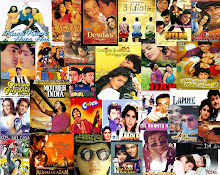Released 10/20/1995
Producer: Yash Chopra
Director: Aditya Chopra
Screenplay: Aditya Chopra
Music: Jatin Pandit, Lalit Pandit
Lyrics: Anand Bakshi
Cinematography: Manmohan Singh
Art Direction: Shamishta Roy
Choreography: Saroj Khan, Farah Khan
Playback singers: Udit Narayan, Lata Mangeshkar, Kumar Sanu, Asha Bhosle & Abhijett, Pamela Chopra and Manpreet Kaur
Starring: Shah Rukh Khan, Kajol, Anupam Kher, Farida Jalal, Amrish Puri, Satish Shah, Pooja Ruparel, Himpani Shivpuri, Mandra Bedi, Parmeet Sethi and more.
Dilwale Dulhania Le Jayenge (The Brave-hearted Will Take the Bride) is India's "Casablanca," a film made without any idea of its future success and fame. It captured a nation's heart and changed Bollywood filmmaking. This year, DDLJ surpasses 500 continuous showings setting a record. The film is still shown in Maratha Mandir Cinema in Mumbai and has been featured in various film festivals, nationally and internationally.
From my perspective, it is story about the fulfillment of a young girl's romantic dream of love.
The overall tone of the film is light-hearted, joyful and playful -- for example, early in the film, Simran (Kajol), the oldest daughter of a London-based Indian family, sings of a dream lover and dances with joy reflecting youthful innocence and exuburance. When her father Chaudhry Baldev Singh (Amrish Puri) receives a letter from his old friend back in his Indian village, Simran is reminded of her arranged marriage to her father's friend's son. Her dream is shattered.
Simran's friends convince her to take a month long trip with them on Eurorail. Simran persuades her father to let her go as a last outing before her marriage.
Raj Malhotra (Shah Rukh Khan), the carefree, mischievous son of a rich business man, has also planned to take a trip with his friends on Eurorail before he enters his father's business. Simran and Raj cross paths during the trip and after a series of misunderstandings and misadventures, they fall in love.
The crux of the story is how will Raj and Simran get back together. Simran has gone to India to get married. An Indian marriage ritual is celebrated for several days before the actual marriage ceremony. Raj has just a few days to figure out a way to charm Simran's father into letting him marry Simran. This appears to be an impossible task because promises have been made and Bauji's honor is at stake if Simran does not marry his friend's son.
Even Simran believes it is impossible when she pleads with Raj to elope with her. But, Raj wants her father's permission to wed Simran because while he, too, has lived in London all his life, he is Indian in his heart and wants to uphold tradition.
Vignettes of members of both the bride and groom's family illuminate their outlook and character. Simran's mature younger sister is her confidant. Simran's mother is her friend. At one point, Simran's mother (Farida Jalal) offers to assist the young lovers in eloping but Raj convinces her that his way is right. Ajit Singh's son, Kamalijeet, is portrayed as a selfish, brutal man. Simran's Aunt plays Raj's father's romantic interest. Grandmothers, Aunts, Uncles, siblings, and friends fill the house with activities surrounding various stages of the marriage preparations and celebrations.
The movie is full of humorous moments. Raj flirts with Simran, his piano-playing gymnastics are a hoot, and he continues to tease and play jokes on Simran. I appreciated the subtle humor of the love song between Simran and Raj as they revisited their time together in Europe in fantasy. Now all the times Raj was inconsiderate, he is sweet and thoughtful, and all the times Simran was angry or ungrateful, she is cheerful and affectionate.
Interlaced with wonderful song and dance routines, the movie maintains a fast pace. Early in the film, while the group of Eurorail travelers attend a party, Raj's surprise song and dance routine that he performs to entertain his friends is funny, full of energy, and flirtatious as he sings to Simran. Plus, Simran's drunken escapade through the streets of Switzerland is wonderfully funny as Raj races after her. Also, during the marriage celebrations, Raj slips his way into the proceedings and leads a wonderful counterpoint dance with the ladies.
In the end, while the young people do not follow the traditions of their elders in the same manner, they retain what they perceive as the important facets of their traditions, chastity, loyalty, respect, commitment, and honor.
Music ties the story together with the recurring haunting notes from the song, Tujhe Dekha.
DDLJ Info Bits ----
According to author, Anupama Chopra, DDLJ director, Aditya Chopra, son of director and producer Yash Chopra, has become an enigma. He rarely gives interviews and prefers anonymity because he likes to go to movie theatres to watch new releases without being noticed.
DDLJ's theme is that generations of non-resident Indians the world-over can still hold traditional Indian values. That sentiments about non-resident Indians are expressed at all, I find interesting. I wonder if it is India's strong emphasis on family ties that reaches across borders to distant relatives and countrymen.
my 1000th Indian film: Inaam Dus Hazaar
6 years ago

No comments:
Post a Comment